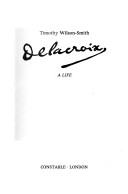Biography & Memoirs
1 total work
This biography of the French Romantic artist Eugene Delacroix (1798-1863) offers a portrait of his life, loves, work and perpetual struggle for recognition. Delacroix's work marked a complete break from the neo-classical values of his predecessors such as David and his mentor Guerin. He became a dazzling colourist, depicting scenes of hunting, contemporary battles and animals in combat. Rubens, Gericault and Constable all influenced his paintings, and his imagination was fired by the works of Shakespeare, Scott and Byron, who instilled in him the love of the exotic, particularly North Africa, where he went as an official artist on a diplomatic expedition. His bold and unorthodox style, and his sense of freedom, were to prove a barrier for much of his life, against acceptance by the establishment - the "Institute" was founded by Napoleon. However, to younger artists such as Fatin-Latour and Manet, and writers like Stendhal and Baudelaire, he was an idol. They saw in him a symbol of revolution and independence. Delacroix was also a lifelong friend of the exiled Chopin and George Sand.
